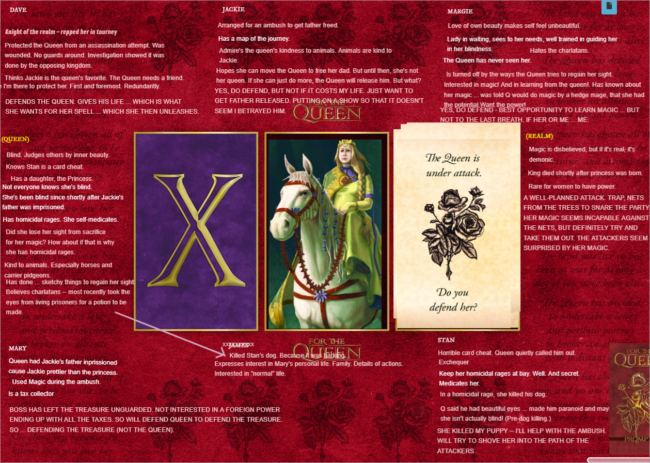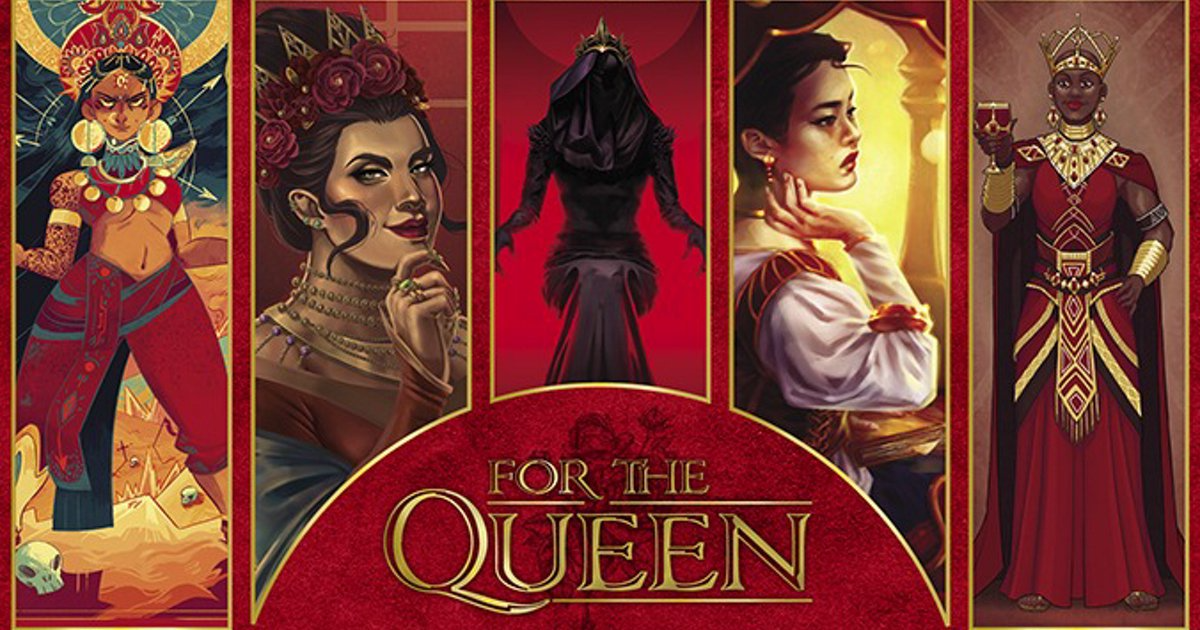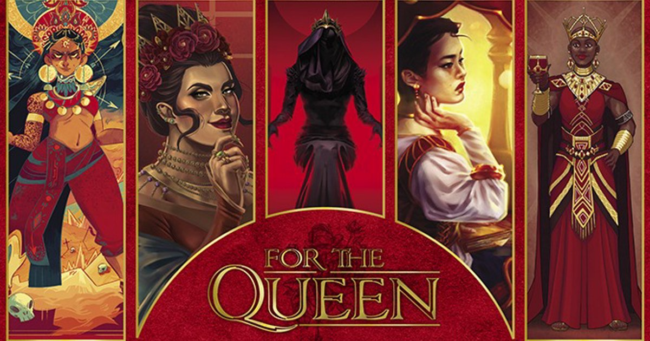We needed to fill in for a Friday D&D night where we wouldn’t be at full strength. So …
I’ve played For the Queen a few times before — with actual cards and a table-top — and enjoyed it. In this case, with our band of friends, it was still easier to do in Roll20 on a VTT, and it so happens that the game has a Roll20 version.
The Basics
The game is GM-less (except for someone to kind of help with rules, VTT oddities, etc.), so everybody plays. That’s a bonus for me.
The group decides on a queen from a deck of pictures, all of them interesting and with possibilities just visually.
The story setting is literally this simple:
- The land you live in has been at war for as long as any of you have been alive.
- The Queen has decided to undertake a long and perilous journey to broker an alliance with a distant power.
- The Queen has chosen all of you, and no one else, to be her retinue, and accompany her on this journey.
- She chose you because she knows that you love her.
And that’s it. The setting, the war, the journey, the time period, the nature of the queen, the nature and roles of the characters, all come out from the players as, one at a time, they draw Prompt cards that ask questions. E.g.,
- You were summoned to a private meeting with the Queen once. Why did you feel disappointed afterward?
- What do you do for the Queen that no one else can do?
- Who is this distant power you are travleing to, and why do they make you uneasy?
Other players can expand on those questions with suggestions or follow-ups. A player can also pass a card on if they can’t think of an answer … or they can use an X-Card option to delete a card (or answer) that is problematic or that they simply don’t want to see in the game.
Players can give their answers in whatever tone or voice they like (“Jason was really upset when …” or “I always look forward to …” or “Dear Diary …”). Most folk (in my limited experience) to third person.
The focus of most of the cards (explicitly or implicitly) is the character’s relationship with the Queen. We know the Queen has chosen you for this trip because she knows you love her. But … is she correct? Do you? Why? Why not? Is that feeling pragmatic? Romantic? Dutiful? A clever (or desperate) facade? How unalloyed is that love? What, if any, are its limits?
And how does each further answer given by someone else color what you think?
All that’s going to be tested, at the very end …
 Play goes around the table, slowly building up and riffing off of each other’s answers and what facts (or opinions) have been established. This goes for 30-120 minutes until the game-ending card is drawn:
Play goes around the table, slowly building up and riffing off of each other’s answers and what facts (or opinions) have been established. This goes for 30-120 minutes until the game-ending card is drawn:
The Queen is under attack. Do you defend her?
At which point play proceeds around the table one more time, with all the players/characters each answering that question. It could be a description of a staunch defense. It could be a sketchy partial defense short of death. Heck, I’ve seen videos of games where one of the players was the attacker, taking their vengeance with a knife to the back.
I.e., just like everything else, the nature, and possibly the result, of the attack is dependent on the story being told. The aftermath may never be known (or may be discussed later over beers). But at that point the game is over.
Playing on a VTT
This game works very neatly in Roll20 (you can buy it from the Roll20 store) because it’s rules-light and functions on card decks — an instructions deck, a deck of queens to select from, and a deck of 46 prompts.
(You could, if you have a boxed set, actually recreate it in Roll20, but it might not be worth the effort.)
Roll20’s card deck mechanics can be a little wonky, but the pre-settings of the mechanics worked neatly for players drawing Prompt cards, and the GM can take care of the shuffling and bringing out and hiding the decks, which is really all you need.
The other advantage that Roll20 provides, to my mind, is a desktop to write down notes as people expand the mythos of their characters, the world, and the Queen.
Our Game
We ran in Roll20 with a group of five (was to be six, but someone was under the weather at the last moment).
I decided it would be more expeditious to simply pull the rules into a single handout, rather than walk through people reading each individual rule card. That’s a charming mechanism, and would work well getting a group of players used to talking aloud with card draws, but it seemed unnecessary. Plus I was busy tweaking some of the rule actions and notes (e.g., just asserting that the GM would flip three Queen cards and that the players could then choose).
The standard timing mechanism is to slide the “The Queen Is Under Attack” card into the Prompt deck manually — about halfway down for a 30 minute game, or lower down for something longer (as the canon established become more elaborate, the game slows down some). I used a suggestion I saw from the game’s creator and simply set a timer for the group-desired time (an hour). When the “The Queen Is Under Attack” card came up, I simply pulled it aside until the time went off (in retrospect, I should have just dealt it to myself to hold until then).
I had pre-randomized the players to establish play order, putting their names on the edges of the tabletop as a place to scribble notes. I also added a couple of areas for lore about The Queen and The Realm.
I made extensive use of those note areas, and, in fact, wrote the notes for most of the characters myself — because that’s me, and because I can type quickly and could do it while people were talking.
Though there was a lot of lore casting aspersions on the Queen (indeed, one of the players started off with a card that she’d planned an assassination attempt on her), only two of the characters ended up not really defending her. The exchequer whose dog the Queen had killed took advantage of the final attack to try and kill her, and the tax collector moved off to protect the treasure they were carrying. Two of the defenders were half-hearted, still wanting something from the Queen but not willing to lay down their lives if it came to it.
It having been established that the Queen knew black magic (which was how she had held off that first assassination attempt), it was only when the knight of the realm (me) assured her he’d give his life for her that she said, “Yep, that’s what I need for my spell, thanks, O Knight,” and drained said life. He willingly, if a bit disappointedly, fell back into the darkness of death, and as I was the last player around the table, we left it with a freeze frame of character reaction shots as her big spell to “smite her enemies” went off, Butch & Sundance-style.
Fun times!
I loved how the players, from the get-go, were willing to both lean into tweaking the story in unexpected ways (the Queen used magic to thwart the first attack! The Queen killed my dog! The Queen imprisoned Character J’s father because Character J is more beautiful than her own daughter. Oh, the Queen is blind — was that a cost of losing magic? Or was the cost her occasionally homicidal rages?) that everyone else could riff on for their own next card. Sometimes that was due to a suggestion, sometimes it came organically.
Everyone seemed to enjoy themselves. Here’s the tabletop we ended with.

The Verdict
This is a great pickup game that requires minimal prep (I did some, not for the campaign, but to smooth out the rules and make sure the tabletop was how I wanted it — again, that’s my kink). It could also be a targeted destination for an evening, scalable from a half to two hours (suggestion: take a break after an hour or so).
The game is designed for 2-6, and I suspect that the number of players will vary things a lot. More players create more hooks, but also make it take longer before things come back around to you, so each character is, in a sense, more shallow the more players there are around the table, unless you make the game longer. (Going over five also creates some group dynamic changes, letting some players fade more into the background.) Our five-for-an-hour worked well.
I can’t say how having someone who is not into RP (“I like to roll dice and hit things with my sword”) would affect the gameplay. It’s not necessary improv theater RP, but storytelling about a character, and since any prompt question can be answered centered around a dagger or fireball as easily as around any emotion, it should work out okay, especially with other players offering suggestions or questions to flesh things out.
The game is definitely replayable, as players define everything through the prompt questions. For example, you can really choose any setting. Our defaulting to vague Medieval fantasy is common, and a lot of the queen images support that — but this really could be set in a modern era (political, business), in space opera, among anthropomorphic woodland creatures, in the Old West, etc. For example, the queen might be the CEO, the journey a critical business trip to meet with execs from a third corporation, the players the business team she chose to bring along because she knows they are all fiercely loyal to her.
Indeed, Evil Hat, the company that produces the game, has put out an SRD that lets people come up with their own overarching story setting and prompt questions in distinctly different settings — because the setting is just a backdrop., the game being about exploring a relationship, a character, and a final decision.
In retrospect, this game sort of hit the sweet spot between the most recent games we’ve done on non-D&D nights: Fiasco (which seems much more demanding of the imagination and of live-RPing skills) and Killer Ratings (where the GM has to do more heavy lifting of the setting). For the Queen instead uses some occasionally gobsmacking questions to draw out that creativity, avoiding the heavy worldbuilding because the game is not about that, but about the characters building themselves through their relationship to the Queen. Very neatly done.
For the Queen deserves its very positive reputation.



